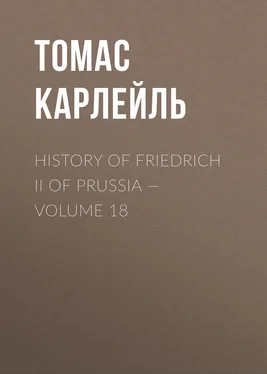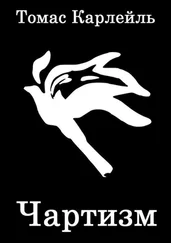Томас Карлейль - History of Friedrich II of Prussia — Volume 18
Здесь есть возможность читать онлайн «Томас Карлейль - History of Friedrich II of Prussia — Volume 18» — ознакомительный отрывок электронной книги совершенно бесплатно, а после прочтения отрывка купить полную версию. В некоторых случаях можно слушать аудио, скачать через торрент в формате fb2 и присутствует краткое содержание. Жанр: foreign_prose, История, literature_19, foreign_edu, foreign_antique, на английском языке. Описание произведения, (предисловие) а так же отзывы посетителей доступны на портале библиотеки ЛибКат.
- Название:History of Friedrich II of Prussia — Volume 18
- Автор:
- Жанр:
- Год:неизвестен
- ISBN:нет данных
- Рейтинг книги:5 / 5. Голосов: 1
-
Избранное:Добавить в избранное
- Отзывы:
-
Ваша оценка:
- 100
- 1
- 2
- 3
- 4
- 5
History of Friedrich II of Prussia — Volume 18: краткое содержание, описание и аннотация
Предлагаем к чтению аннотацию, описание, краткое содержание или предисловие (зависит от того, что написал сам автор книги «History of Friedrich II of Prussia — Volume 18»). Если вы не нашли необходимую информацию о книге — напишите в комментариях, мы постараемся отыскать её.
History of Friedrich II of Prussia — Volume 18 — читать онлайн ознакомительный отрывок
Ниже представлен текст книги, разбитый по страницам. Система сохранения места последней прочитанной страницы, позволяет с удобством читать онлайн бесплатно книгу «History of Friedrich II of Prussia — Volume 18», без необходимости каждый раз заново искать на чём Вы остановились. Поставьте закладку, и сможете в любой момент перейти на страницу, на которой закончили чтение.
Интервал:
Закладка:
The Austrian force at Reichenberg was 20,000; would have been 30 and odd thousands, had Maguire come up (as he might have done, had not the appearances alarmed him too much); Bevern, minus the Detachment sent against Maguire, was but 15,000 in fight; and he has quite burst the Austrians away, who had plugged his road for him in such force: is it not a comfortable little victory, glorious in its sort; and a good omen for the bigger things that are coming? Bevern marched composedly on, after this inspiriting tussle, through Liebenau and what defiles there were; April 24th, at Turnau, he falls into the Schwerin Column; incorporates himself therewith, and, as subordinate constituent part, accompanies Schwerin thenceforth.
3. "Column THIRD was Schwerin's, out of Schlesien; counted to be 32,000 foot, 12,000 horse. Schwerin, gathering himself, from Glatz and the northerly country, at Landshut,—very careless, he, of the pleasant Hills, and fine scattered peaks of the Giant Mountains thereabouts,—was completely gathered foremost of all the Columns, having farthest to go. And on Monday, 18th April, started from Landshut, Winterfeld leading one division. In our days, it is the finest of roads; high level Pass, of good width, across the Giant Range; pleasant painted hamlets sprinkling it, fine mountain ridges and distant peaks looking on; Schneekoppe (SNOWfell, its head bright-white till July come) attends you, far to the right, all the way:—probably Sprite Rubezahl inhabits there; and no doubt River Elbe begins his long journey there, trickling down in little threads over yonder, intending to float navies by and by: considerations infinitely indifferent to Schwerin. 'The road,' says my Tourist, (is not Alpine; it reminds you of Derbyshire-Peak country; more like the road from Castletown to Sheffield than any I could name;'—we have been in it before, my reader and I, about Schatzlar and other places. Trautenau, well down the Hills, with swift streams, more like torrents, bound Elbe-wards, watering it, is a considerable Austrian Town, and the Bohemian end of the Pass,—Sohr only a few miles from it: heartily indifferent to Schwerin at this moment; who was home from the Army, in a kind of disfavor, or mutual pet, at the time Sohr was done. Schwerin's March we shall not give; his junction with Bevern (at Turnau, on the Iser, April 24th), then their capture of Jung-Bunzlau Magazine, and crossing of the Elbe at Melnick, these were the important points; and, in spite of Konigseck's tusslings, these all went well, and nothing was lost except one day of time."
The Austrians, some days ago, as we observed, filed THROUGH Prag,—Sunday, May 1st, not a pleasant holiday-spectacle to the populations;—and are all encamped on the Ziscaberg high ground, on the other side of the City. Had they been alert, now was the time to attack Friedrich, who is weaker than they, while nobody has yet joined him. They did not think of it, under Prince Karl; and Browne and the Prince are said to be in bad agreement.
Chapter II.—BATTLE OF PRAG
Monday morning, 2d May, 1757, the Vanguard, or advanced troops of Friedrich's Column, had appeared upon the Weissenberg, northwest corner of Prag (ground known to them in 1744, and to the poor Winter-King in 1620): Vanguard in the morning; followed shortly by Friedrich himself; and, hour after hour, by all the others, marching in. So that, before sunset, the whole force lay posted there; and had the romantic City of Prag full in view at their feet. A most romantic, high-piled, many-towered, most unlevel old City; its skylights and gilt steeple-cocks glittering in the western sun,—Austrian Camp very visible close beyond it, spread out miles in extent on the Ziscaberg Heights, or eastern side;—Prag, no doubt, and the Austrian Garrison of Prag, taking intense survey of this Prussian phenomenon, with commentaries, with emotions, hidden now in eternal silence, as is fit enough. One thing we know, "Head-quarter was in Welleslawin:" there, in that small Hamlet, nearly to north, lodged Friedrich, the then busiest man of Europe; whom Posterity is still striving for a view of, as something memorable.
Prince Karl, our old friend, is now in chief command yonder; Browne also is there, who was in chief command; their scheme of Campaign gone all awry. And to Friedrich, last night, at his quarters "in the Monastery of Tuchomirsitz," where these two Gentlemen had lodged the night before, it was reported that they had been heard in violent altercation; [ Helden-Geschichte, iv. 11 (exact "Diary of the march" given there).]—both of them, naturally, in ill-humor at the surprising turn things had taken; and Feldmarschall Browne firing up, belike, at some platitude past or coming, at some advice of his rejected, some imputation cast on him, or we know not what. Prince Karl is now chief; and indignant Browne, as may well be the case, dissents a good deal,—as he has often had to do. Patience, my friend, it is near ending now! Prince Karl means to lie quiet on the Ziscaberg, and hold Prag; does not think of molesting Friedrich in his solitary state; and will undertake nothing, "till Konigseck, from Jung-Bunzlau, come in," victorious or not; or till perhaps even Daun arrive (who is, rather slowly, gathering reinforcement in Maren): "What can the enemy attempt on us, in a Post of this strength?" thinks Prince Karl. And Browne, whatever his insight or convictions be, has to keep silence.
"Weissenberg," let readers be reminded, "is on the hither or western side of Prag: the Hradschin [pronounce RadSHEEN, with accent on the last syllable, as in "SchwerIN" and other such cases], the Hradschin, which is the topmost summit of the City and of the Fashionable Quarter,—old Bohemian Palace, still occasionally habitable as such, and in constant use as a DOWNING STREET,—lies on the slope or shoulder of the Weissenberg, a good way from the top; and has a web of streets rushing down from it, steepest streets in the world; till they reach the Bridge, and broad-flowing Moldau (broad as Thames at half-flood, but nothing like so deep); after which the streets become level, and spread out in intricate plenty to right and to left, and ahead eastward, across the River, till the Ziscaberg, with frowning precipitous brow, suddenly puts a stop to them in that particular direction. From Ziscaberg top to Weissenberg top may be about five English miles; from the Hradschin to the foot of Ziscaberg, northwest to southeast, will be half that distance, the greatest length of Prag City. Which is rather rhomboidal in shape, its longer diagonal this that we mention. The shorter diagonal, from northmost base of Ziscaberg to southmost of Hradschin, is perhaps a couple of miles. Prag stands nestled in the lap of mountains; and is not in itself a strong place in war: but the country round it, Moldau ploughing his rugged chasm of a passage through the piled table-land, is difficult to manoeuvre in.
"Moldau Valley comes straight from the south, crosses Prag; and—making, on its outgate at the northern end of Prag (end of 'shortest diagonal' just spoken of), one big loop, or bend and counter-bend, of horse-shoe shape," which will be notable to us anon—"again proceeds straight northward and Elbe-ward. It is narrow everywhere, especially when once got fairly north of Prag; and runs along like a Quasi-Highland Strath, amid rocks and hills. Big Hill-ranges, not to be called barren, yet with rock enough on each hand, and fine side valleys opening here and there: the bottom of your Strath, which is green and fertile, with pleasant busy Villages (much intent on water-power and cotton-spinning in our time), is generally of few furlongs in breadth. And so it lasts, this pleasant Moldau Valley, mile after mile, on the northern or Lower Moldau, generally straight north, though with one big bend eastward just before ending; and not till near Melnick, or the mouth of Moldau, do we emerge on that grand Elbe Valley,—glanced at once already, from Pascopol or other Height, in the Lobositz times."
Читать дальшеИнтервал:
Закладка:
Похожие книги на «History of Friedrich II of Prussia — Volume 18»
Представляем Вашему вниманию похожие книги на «History of Friedrich II of Prussia — Volume 18» списком для выбора. Мы отобрали схожую по названию и смыслу литературу в надежде предоставить читателям больше вариантов отыскать новые, интересные, ещё непрочитанные произведения.
Обсуждение, отзывы о книге «History of Friedrich II of Prussia — Volume 18» и просто собственные мнения читателей. Оставьте ваши комментарии, напишите, что Вы думаете о произведении, его смысле или главных героях. Укажите что конкретно понравилось, а что нет, и почему Вы так считаете.









